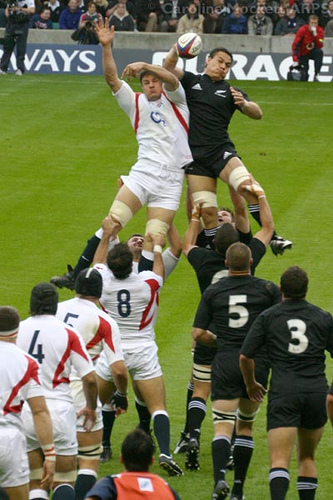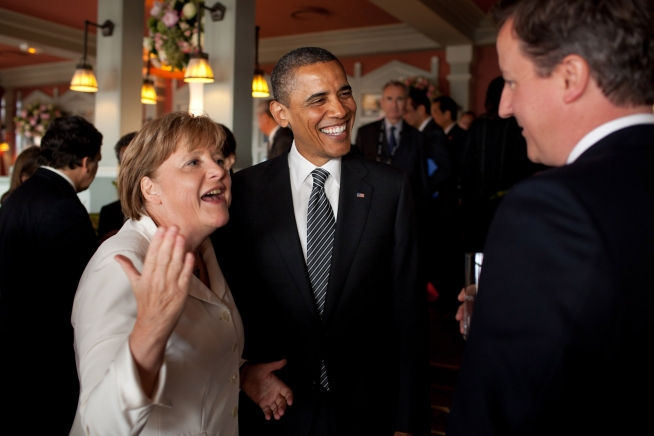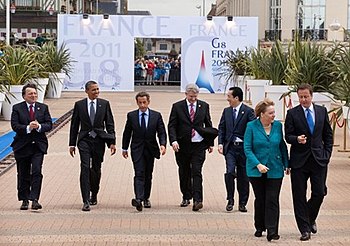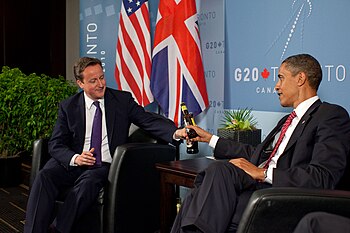|
|
| English: President Barack Obama talks with German Chancellor Angela Merkel and British Prime Minister David Cameron before the start of the working G8 dinner at Le Ciro’s Barriere Restaurant in Deauville, France, May 25, 2011. (Official White House Photo) (Photo credit: Wikipedia) |
|
|
| American writer Dorothy Parker (1893-1967) (Photo credit: Wikipedia) |
|
|
| G8 leaders caricatures 20110523 (Photo credit: Wikipedia) |
|
|
| English: Logo of The Goldman Sachs Group, Inc. Category:Goldman Sachs (Photo credit: Wikipedia) |
|
|
| English: World leaders walk to the first working session at the G8 summit in Deauville, France, May 26, 2011. Pictured, from left are: European Commission President Jose Manuel Barroso; United States President Barack Obama; French President Nicolas Sarkozy; Canadian Prime Minister Stephen Harper; Japanese Prime Minister Naoto Kan; German Chancellor Angela Merkel; and British Prime Minister David Cameron. May 26, 2011. (Official White House Photo by Official White House Photo by Lawrence Jackson) (Photo credit: Wikipedia) |
|
|
| English: US President Barack Obama and British Prime Minister David Cameron trade bottles of beer to settle a bet they made on the U.S. vs. England World Cup Soccer game (which ended in a tie), during a bilateral meeting at the G20 Summit in Toronto, Canada, Saturday, June 26, 2010. (Photo credit: Wikipedia) |
I am beginning to feel ashamed of myself. I started this
web site, as we called it then, Boyce’s Paper, in 1996, long before blogs had
ever been heard of, at a time when it had become obvious to me that anyone I
might wish to write for had no money to pay me. Therefore, when since asked am
I retired, I answer, “Well, I suppose so. They’ve stopped paying me, so I have
stopped writing. You could call it being retired.”
My purpose was simply to have a sounding off place,
somewhere to express my opinion without fear or favour, and originally I
thought maybe I could do it every day.
Any readers I still have --- you are few, believe me ---
will have noticed that I have not written much in the last three months, and
will perhaps have been surprised that lots of world-shaking events have been
occurring about which I have had not a word to say. I have blamed my lack of
mobility following the fracturing of my Achilles tendon. But that is not the
real reason.
The real reason is that world events seem so confusing, so
tumultuous, and so unfavourable to the ideals for an improved world that I used
to hold, that I have begun to wonder whether it is all worth it. I have always
known that anything I have to say is insignificant, but I have always previously
thought it was worth putting in my two cents worth of opinion and letting the
chips fall where they may. Now, like my fifty-ish, sons, I find myself asking,
“What’s it all about? What does it all mean? Is it worth the effort?”
I decided from the first that if they wouldn’t pay me to
write any more, I could not afford to spend money on my web site, so today I
can say I have never spent a penny on it, nor earned a penny from it, thus
consigning myself to my own oblivion. Never mind, I still find it therapeutic.
In fact, after being at it since at least 1942 --- before I left high school
--- I have to admit that writing has become almost like a reflex action for me.
I can’t stop doing it, come what may. In fact, writing is certainly number one
in the list of professions from which it is impossible to retire. It gets its
grip on you, and you are pulled along helplessly by it, kicking and screaming.
But I have only to contemplate the possibility that Stephen
Harper might conceivably be re-elected to realize that I am not so indifferent
as I have recently begun to feel. Don't ask me about that, you will probably
stop a stream of invective: we have to get rid of this guy with his whole coterie
of half-witted ministers and backward -thinking acolytes, and their
antediluvian ultra-capitalistic ideas.
Part of my feeling of impotence comes from my long
recognition that no journalist individually has any significance in the broad
spectrum of society, its ideas and its purposes. Although I have always known
this, it has become even more clear in recent years as the mainstream press has
fallen into the ownership of huge companies whose only interest is to guard the
existing economic system in which they have gained their obscene success. The
impotence of the North American press in face of the huge economic crisis that
was manufactured by the ultra-conservative capitalist class, their supine
acquiescence as the Goldman Sachs boys moved into positions of power throughout
the Western world and began to issue their marching orders, and their
unquestioning acceptance that the State should provide unheard of welfare payments to the staggering companies
and banks that were said to be “too big to fail”, all these blew the
pretensions about the freedom of the press into smithereens.
Well, okay: given all that, what follows are some simple
thoughts that occurred to me watching from the sidelines as world events have
marched across the page in recent months:
1. On the refugee crisis in Europe: Some perspective
is needed. Europe was freaking out even when the numbers involved were small,
like 6000 or so a month. Europe’s population is hitting the 300 million, right?
And they are freaking out at the prospect of absorbing 160,000 incoming people,
evidently, most of them people with reasonable educations, well-dressed, and
most of whom have had enough money to pay the people smugglers to get them out
of their home countries as they burn. By contrast, Canada has 34 million, and
for years we have absorbed anything from 160,000 to 250,000 incoming people a
year, year after year. Even given the
differences between Canada and Europe, culturally, economically and socially,
it has to be admitted surely that the numbers in themselves are not the problem.
The people “swarming” in, to use British Prime Minister David Cameron’s
scaremongering word, can be successfully absorbed into Europe. All they have to
do is to set aside their prejudices, ingrained for generations, against
outsiders, against non-white people, against foreign religionists, and against
incoming poor people.
That might seem a big demand, but Chancellor Angela
Merkel, for one, seems to have got the point. And it is no coincidence that her
pronouncements on the many tens, even hundreds of thousands that Germany can
absorb coincide with a Guardian Weekly front page of August 28, headlined:
“Europe in Need of a Baby Boom; Birthrate fall is a threat to economic prosperity; Immigration could avert population disaster."
2.
The “success” of capitalist economics: Anyone
who believes that capitalism is serving the interests of everyone need only
look at the link I put on this web site yesterday. Dealing with the United
States (and Canada cannot surely be so different) it shows that since 1973,
productivity has risen by 72 per cent, but “
the typical worker received little if any benefit
from their contribution to increased net output. Said differently, they
suffered from wage stagnation despite a growing economy.” The conclusion of
this study by the Economic Policy Institute was that “there has been a change
in power relations between owners of capital and workers, which has enabled the
former to shift the distribution of national income to their favor at the
expense of the latter. In other words, corporations are now keeping a larger
share of national income for their own use, increasingly
to fund mergers,
stock buy-backs, and dividend payments.”
Nuff
sed!
3.
The hidden factor: insane population increases: here it is time for me to trot out a story I
have told many times, about Bangladesh. In 1975, when I was living back in New
Zealand, I attended an international conference of the Human Ecology movement, and
I heard an expert from Bangladesh say that by the end of the century his
country would have a population of 125 million, if birthrates continued at
their present level. I began to think
what this could have meant in social terms: I discovered Bangladesh’s area
(143,000 square kilometres) was roughly comparable to the South Island of New Zealand
(151,000 sq kms), where I was born. So I tried to project 125 million people
over the South Island, and discovered that every settlement of 1,000 or more
would have to have a million people. In other words it was unimaginable. By the
end of the century, the population of Bangladesh was already outstripping the
projected 125 million, and today it is estimated at 160 million. In other
words, it is unthinkable; but yet, it exists. Similar figures can be shown for African
countries. Kenya now has 45 million; 100 years ago it had 2.9 million. Nigeria,
which in 1932 had 30 million people, now has 178 million. To get back to the European
immigration crisis, an evident conclusion from these rates of growth is that
people are going to have to be more equally shared around the world. Such crises
are inevitable.
Okay,
that’ll do for the day.
In the next month my
attention --- I am a dedicated watcher of world events, remember --- is going
to be entirely concentrated on the Rugby World Cup, opening in London next
week, and ending at the end of October.
With, inevitably, a
victory by the All Blacks of New Zealand….
Bread and circuses!












